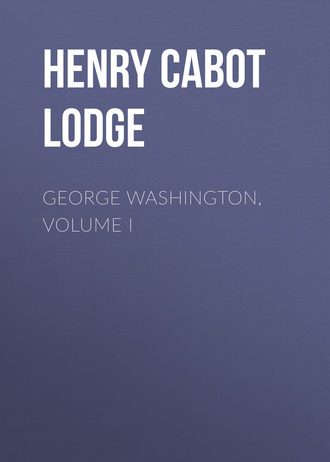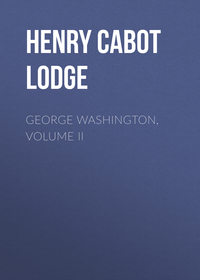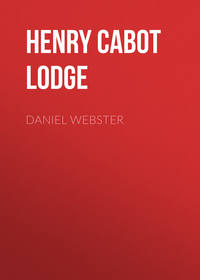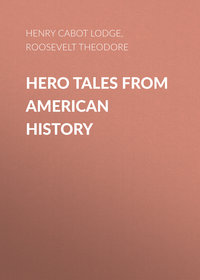 полная версия
полная версияGeorge Washington, Volume I
The active and moving spirit in the party, however, was one Conway, an Irish adventurer, who made himself so prominent that the whole affair passed into history bearing his name, and the "Conway cabal" has obtained an enduring notoriety which its hero never acquired by any public services. Conway was one of the foreign officers who had gained the favor of Congress and held the rank of brigadier-general, but this by no means filled the measure of his pretensions, and when De Kalb was made a major-general Conway immediately started forward with claims to the same rank. He received strong support from the factious opposition, and there was so much stir that Washington sharply interfered, for to his general objection to these lavish gifts of excessive rank was added an especial distrust in this particular case. In his calm way he had evidently observed Conway, and with his unerring judgment of men had found him wanting. "I may add," he wrote to Lee, "and I think with truth, that it will give a fatal blow to the existence of the army. Upon so interesting a subject I must speak plainly. General Conway's merit then as an officer, and his importance in this army, exist more in his own imagination than in reality." This plain talk soon reached Conway, drove him at once into furious opposition, and caused him to impart to the faction a cohesion and vigor which they had before lacked. Circumstances favored them. The victory at Saratoga gave them something tangible to go upon, and the first move was made when Gates failed to inform Washington of the surrender, and then held back the troops sent for so urgently by the commander-in-chief, who had sacrificed so much from his own army to secure that of the north.
At this very moment, indeed, when Washington was calling for troops, he was struggling with the utmost tenacity to hold control of the Delaware. He made every arrangement possible to maintain the forts, and the first assaults upon them were repulsed with great slaughter, the British in the attack on Fort Mercer losing Count Donop, the leader, and four hundred men. Then came a breathing space, and then the attacks were renewed, supported by vessels, and both forts were abandoned after the works had been leveled to the ground by the enemy's fire. Meanwhile Hamilton, sent to the north, had done his work; Gates had been stirred, and Putnam, well-meaning but stubborn, had been sharply brought to his bearings. Reinforcements had come, and Washington meditated an attack on Philadelphia. There was a good deal of clamor for something brilliant and decisive, for both the army and the public were a little dizzy from the effects of Saratoga, and with sublime blindness to different conditions, could not see why the same performance should not be repeated to order everywhere else. To oppose this wish was trying, doubly trying to a man eager to fight, and with his full share of the very human desire to be as successful as his neighbor. It required great nerve to say No; but Washington did not lack that quality, and as general and statesman he reconnoitred the enemy's works, weighed the chances, said No decisively, and took up an almost impregnable position at White Marsh. Thereupon Howe announced that he would drive Washington beyond the mountains, and on December 4 he approached the American lines with this highly proper purpose. There was some skirmishing along the foot of the hills of an unimportant character, and on the third day Washington, in high spirits, thought an attack would be made, and rode among the soldiers directing and encouraging them. Nothing came of it, however, but more skirmishing, and the next day Howe marched back to Philadelphia. He had offered battle in all ways, he had invited action; but again, with the same pressure both from his own spirit and from public opinion, Washington had said No. On his own ground he was more than ready to fight Howe, but despite the terrible temptation he would fight on no other. Not the least brilliant exploit of Wellington was the retreat to the shrewdly prepared lines of Torres Vedras, and one of the most difficult successes of Washington was his double refusal to fight as the year 1777 drew to a close.
Like most right and wise things, Washington's action looks now, a century later, so plainly sensible that it is hard to imagine how any one could have questioned it; and one cannot, without a great effort, realize the awful strain upon will and temper involved in thus refusing battle. If the proposed attack on Philadelphia had failed, or if our army had come down from the hills and been beaten in the fields below, no American army would have remained. The army of the north, of which men were talking so proudly, had done its work and dispersed. The fate of the Revolution rested where it had been from the beginning, with Washington and his soldiers. Drive them beyond the mountains and there was no other army to fall back upon. On their existence everything hinged, and when Howe got back to Philadelphia, there they were still existent, still coherent, hovering on his flank, cooping him up in his lines, and leaving him master of little more than the ground his men encamped upon, and the streets his sentinels patrolled. When Franklin was told in Paris that Howe had taken Philadelphia, his reply was, "Philadelphia has taken Howe."
But, with the exception of Franklin, contemporary opinion in the month of December, 1777, was very different from that of to-day, and the cabal had been at work ever since the commander-in-chief had stepped between Conway and the exorbitant rank he coveted. Washington, indeed, was perfectly aware of what was going on. He was quiet and dignified, impassive and silent, but he knew when men, whether great or small, were plotting against him, and he watched them with the same keenness as he did Howe and the British.
In the midst of his struggle to hold the Delaware forts, and of his efforts to get back his troops from the north, a story came to him that arrested his attention. Wilkinson, of Gates's staff, had come to Congress with the news of the surrender. He had been fifteen days on the road and three days getting his papers in order, and when it was proposed to give him a sword, Roger Sherman suggested that they had better "give the lad a pair of spurs." This thrust and some delay seem to have nettled Wilkinson, who was swelling with importance, and although he was finally made a brigadier-general, he rode off to the north much ruffled. In later years Wilkinson was secretive enough; but in his hot youth he could not hold his tongue, and on his way back to Gates he talked. What he said was marked and carried to headquarters, and on November 9 Washington wrote to Conway:—
"A letter which I received last night contained the following paragraph,—'In a letter from General Conway to General Gates he says, "Heaven has determined to save your country, or a weak general and bad counsellors would have ruined it" I am, sir, your humble servant,'" etc.
This curt note fell upon Conway with stunning effect. It is said that he tried to apologize, and he certainly resigned. As for Gates, he fell to writing letters filled with expressions of wonder as to who had betrayed him, and writhed most pitiably under the exposure. Washington's replies are models of cold dignity, and the calm indifference with which he treated the whole matter, while holding Gates to the point with relentless grasp, is very interesting. The cabal was seriously shaken by this sudden blow. It must have dawned upon them dimly that they might have mistaken their man, and that the silent soldier was perhaps not so easy to dispose of by an intrigue as they had fancied. Nevertheless, they rallied, and taking advantage of the feeling in Congress created by Burgoyne's surrender, they set to work to get control of military matters. The board of war was enlarged to five, with Gates at its head and Mifflin a member, and, thus constituted, it proceeded to make Conway inspector-general, with the rank of major-general. This, after Conway's conduct, was a direct insult to Washington, and marks the highest point attained by his opponents.
In Congress, too, they became more active, and John Jay said that there was in that body a party bitterly hostile to Washington. We know little of the members of that faction now, for they never took the trouble to refer to the matter in after years, and did everything that silence could do to have it all forgotten. But the party existed none the less, and significant letters have come down to us, one of them written by Lovell, and two anonymous, addressed respectively to Patrick Henry and to Laurens, then president, which show a bitter and vindictive spirit, and breathe but one purpose. The same thought is constantly reiterated, that with a good general the northern army had won a great victory, and that the main army, if commanded in the same way, would do likewise. The plan was simple and coherent. The cabal wished to drive Washington out of power and replace him with Gates. With this purpose they wrote to Henry and Laurens; with this purpose they made Conway inspector-general.
When they turned from intrigue to action, however, they began to fail. One of their pet schemes was the conquest of Canada, and with this object Lafayette was sent to the lakes, only to find that no preparations had been made, because the originators of the idea were ignorant and inefficient. The expedition promptly collapsed and was abandoned, with much instruction in consequence to Congress and people. Under their control the commissariat also went hopelessly to pieces, and a committee of Congress proceeded to Valley Forge and found that in this direction, too, the new managers had grievously failed. Then the original Conway letter, uncovered so unceremoniously by Washington, kept returning to plague its author. Gates's correspondence went on all through the winter, and with every letter Gates floundered more and more, and Washington's replies grew more and more freezing and severe. Gates undertook to throw the blame on Wilkinson, who became loftily indignant and challenged him. The two made up their quarrel very soon in a ludicrous manner, but Wilkinson in the interval had an interview with Washington, which revealed an amount of duplicity and perfidy on the part of the cabal, so shocking to the former's sensitive nature, that he resigned his secretaryship of the board of war on account, as he frankly said, of the treachery and falsehood of Gates. Such a quarrel of course hurt the cabal, but it was still more weakened by Gates himself, whose only idea seemed to be to supersede Washington by slighting him, refusing troops, and declining to propose his health at dinner,—methods as unusual as they were feeble.
The cabal, in fact, was so weak in ability and character that the moment any responsibility fell upon its members it was certain to break down, but the absolutely fatal obstacle to its schemes was the man it aimed to overthrow. The idea evidently was that Washington could be driven to resign. They knew that they could not get either Congress or public opinion to support them in removing him, but they believed that a few well-placed slights and insults would make him remove himself. It was just here that they made their mistake. Washington, as they were aware, was sensitive and high-spirited to the last degree, and he had no love for office, but he was not one of those weaklings who leave power and place in a pet because they are criticised and assailed. He was not ambitious in the ordinary personal sense, but he had a passion for success. Whether it was breaking a horse, or reclaiming land, or fighting Indians, or saving a state, whatever he set his hand to, that he carried through to the end. With him there never was any shadow of turning back. When, without any self-seeking, he was placed at the head of the Revolution, he made up his mind that he would carry it through everything to victory, if victory were possible. Death or a prison could stop him, but neither defeat nor neglect, and still less the forces of intrigue and cabal.
When he wrote to his brother announcing Burgoyne's surrender, he had nothing to say of the slight Gates put upon him, but merely added in a postscript, "I most devoutly congratulate my country and every well-wisher to the cause on this signal stroke of Providence." This was his tone to every one, both in private and public. His complaint of not being properly notified he made to Gates alone, and put it in the form of a rebuke. He knew of the movement against him from the beginning, but apparently the first person he confided in was Conway, when he sent him the brief note of November 9. Even after the cabal was fully developed, he wrote about it only once or twice, when compelled to do so, and there is no evidence that he ever talked about it except, perhaps, to a few most intimate friends. In a letter to Patrick Henry he said that he was obliged to allow a false impression as to his strength to go abroad, and that he suffered in consequence; and he added, with a little touch of feeling, that while the yeomanry of New York and New England poured into the camp of Gates, outnumbering the enemy two to one, he could get no aid of that sort from Pennsylvania, and still marvels were demanded of him.
Thus he went on his way through the winter, silent except when obliged to answer some friend, and always ready to meet his enemies. When Conway complained to Congress of his reception at camp, Washington wrote the president that he was not given to dissimulation, and that he certainly had been cold in his manner. He wrote to Lafayette that slander had been busy, and that he had urged his officers to be cool and dispassionate as to Conway, adding, "I have no doubt that everything happens for the best, that we shall triumph over all our misfortunes, and in the end be happy; when, my dear Marquis, if you will give me your company in Virginia, we will laugh at our past difficulties and the folly of others." But though he wrote thus lightly to his friends, he followed Gates sternly enough, and kept that gentleman occupied as he drove him from point to point. Among other things he touched upon Conway's character with sharp irony, saying, "It is, however, greatly to be lamented that this adept in military science did not employ his abilities in the progress of the campaign, in pointing out those wise measures which were calculated to give us 'that degree of success we could reasonably expect.'"
Poor Gates did not find these letters pleasant reading, and one more curt note, on February 24, finished the controversy. By that time the cabal was falling to pieces, and in a little while was dispersed. Wilkinson's resignation was accepted, Mifflin was put under Washington's orders, and Gates was sent to his command in the north. Conway resigned one day in a pet, and found his resignation accepted and his power gone with unpleasant suddenness. He then got into a quarrel with General Cadwalader on account of his attacks on the commander-in-chief. The quarrel ended in a duel. Conway was badly wounded, and thinking himself dying, wrote a contrite note of apology to Washington, then recovered, left the country, and disappeared from the ken of history. Thus domestic malice and the "bitter party" in Congress failed and perished. They had dashed themselves in vain against the strong man who held firmly both soldiers and people. "While the public are satisfied with my endeavors, I mean not to shrink from the cause." So Washington wrote to Gordon as the cabal was coming to an end, and in that spirit he crushed silently and thoroughly the faction that sought to thwart his purpose, and drive him from office by sneers, slights, and intrigues.
These attacks upon him came at the darkest moment of his military career. Defeated at Brandywine and Germantown, he had been forced from the forts after a desperate struggle, had seen Philadelphia and the river fall completely into the hands of the enemy, and, bitterest of all, he had been obliged to hold back from another assault on the British lines, and to content himself with baffling Howe when that gentleman came out and offered battle. Then the enemy withdrew to their comfortable quarters, and he was left to face again the harsh winter and the problem of existence. It was the same ever recurring effort to keep the American army, and thereby the American Revolution, alive. There was nothing in this task to stir the blood and rouse the heart. It was merely a question of grim tenacity of purpose and of the ability to comprehend its overwhelming importance. It was not a work that appealed to or inspirited any one, and to carry it through to a successful issue rested with the commander-in-chief alone.
In the frost and snow he withdrew to Valley Forge, within easy striking distance of Philadelphia. He had literally nothing to rely upon but his own stern will and strong head. His soldiers, steadily dwindling in numbers, marked their road to Valley Forge by the blood from their naked feet. They were destitute and in rags. When they reached their destination they had no shelter, and it was only by the energy and ingenuity of the General that they were led to build huts, and thus secure a measure of protection against the weather. There were literally no supplies, and the Board of War failed completely to remedy the evil. The army was in such straits that it was obliged to seize by force the commonest necessaries. This was a desperate expedient and shocked public opinion, which Washington, as a statesman, watched and cultivated as an essential element of success in his difficult business. He disliked to take extreme measures, but there was nothing else to be done when his men were starving, when nearly three thousand of them were unfit for duty because "barefoot and otherwise naked," and when a large part of the army were obliged to sit up all night by the fires for warmth's sake, having no blankets with which to cover themselves if they lay down. With nothing to eat, nothing to burn, nothing wherewith to clothe themselves, wasting away from exposure and disease, we can only wonder at the forbearance which stayed the hand of violent seizure so long. Yet, as Washington had foreseen, there was even then an outcry against him. Nevertheless, his action ultimately did more good than harm in the very matter of public opinion, for it opened men's eyes, and led to some tardy improvements and some increased effort.
Worse even than this criticism was the remonstrance of the legislature of Pennsylvania against the going into winter-quarters. They expected Washington to keep the open field, and even to attack the British, with his starving, ragged army, in all the severity of a northern winter. They had failed him at every point and in every promise, in men, clothing, and supplies. They were not content that he covered their State and kept the Revolution alive among the huts of Valley Forge. They wished the impossible. They asked for the moon, and then cried out because it was not given to them. It was a stupid, unkind thing to do, and Washington answered their complaints in a letter to the president of Congress. After setting forth the shortcomings of the Pennsylvanians in the very plainest of plain English, he said: "But what makes this matter still more extraordinary in my eye is that these very gentlemen should think a winter's campaign, and the covering of these States from the invasion of an enemy, so easy and practicable a business. I can answer those gentlemen, that it is a much easier and less distressing thing to draw remonstrances in a comfortable room, by a good fireside, than to occupy a cold, bleak hill, and sleep under frost and snow, without clothes or blankets. However, although they seem to have little feeling for the naked and distressed soldiers, I feel superabundantly for them, and from my soul I pity those miseries which it is neither in my power to relieve or prevent."
This was not a safe man for the gentlemen of Pennsylvania to cross too far, nor could they swerve him, with all his sense of public opinion, one jot from what he meant to do. In the stern rebuke, and in the deep pathos of these sentences, we catch a glimpse of the silent and self-controlled man breaking out for a moment as he thinks of his faithful and suffering men. Whatever happened, he would hold them together, for in this black time we detect the fear which haunted him, that the people at large might give way. He was determined on independence. He felt a keen hatred against England for her whole conduct toward America, and this hatred was sharpened by the efforts of the English to injure him personally by forged letters and other despicable contrivances. He was resolved that England should never prevail, and his language in regard to her has a fierceness of tone which is full of meaning. He was bent, also, on success, and if under the long strain the people should weaken or waver, he was determined to maintain the army at all hazards.
So, while he struggled against cold and hunger and destitution, while he contended with faction at home and lukewarmness in the administration of the war, even then, in the midst of these trials, he was devising a new system for the organization and permanence of his forces. Congress meddled with the matter of prisoners and with the promotion of officers, and he argued with and checked them, and still pressed on in his plans. He insisted that officers must have better provision, for they had begun to resign. "You must appeal to their interest as well as to their patriotism," he wrote, "and you must give them half-pay and full pay in proper measure." "You must follow the same policy with the men," he said; "you must have done with short enlistments. In a word, gentlemen, you must give me an army, a lasting, enduring, continental army, for therein lies independence."14 It all comes out now, through the dust of details and annoyances, through the misery and suffering of that wretched winter, through the shrill cries of ignorance and hostility,—the great, clear, strong policy which meant to substitute an army for militia, and thereby secure victory and independence. It is the burden of all his letters to the governors of States, and to his officers everywhere. "I will hold the army together," he said, "but you on all sides must help me build it up."15
Thus with much strenuous labor and many fervent appeals he held his army together in some way, and slowly improved it. His system began to be put in force, his reiterated lessons were coming home to Congress, and his reforms and suggestions were in some measure adopted. Under the sound and trained guidance of Baron Steuben a drill and discipline were introduced, which soon showed marked results. Greene succeeded Mifflin as quartermaster-general, and brought order out of chaos. The Conway cabal went to pieces, and as spring opened Washington began to see light once more. To have held on through that winter was a great feat, but to have built up and improved the army at such a time was much more wonderful. It shows a greatness of character and a force of will rarer than military genius, and enables us to understand better, perhaps, than almost any of his victories, why it was that the success of the Revolution lay in such large measure in the hands of one man.
After Howe's withdrawal from the Jerseys in the previous year, a contemporary wrote that Washington was left with the remnants of an army "to scuffle for liberty." The winter had passed, and he was prepared to scuffle again. On May 11 Sir Henry Clinton relieved Sir William Howe at Philadelphia, and the latter took his departure in a blaze of mock glory and resplendent millinery, known as the Mischianza, a fit close to a career of failure, which he was too dull to appreciate. The new commander was more active than his predecessor, but no cleverer, and no better fitted to cope with Washington. It was another characteristic choice on the part of the British ministry, who could never muster enough intellect to understand that the Americans would fight, and that they were led by a really great soldier. The coming of Clinton did not alter existing conditions.
Expecting a movement by the enemy, Washington sent Lafayette forward to watch Philadelphia. Clinton and Howe, eager for a victory before departure, determined to cut him off, and by a rapid movement nearly succeeded in so doing. Timely information, presence of mind, and quickness alone enabled the young Frenchman to escape, narrowly but completely. Meantime, a cause for delay, that curse of the British throughout the war, supervened. A peace commission, consisting of the Earl of Carlisle, William Eden, and Governor Johnstone, arrived. They were excellent men, but they came too late. Their propositions three years before would have been well enough, but as it was they were worse than nothing. Coolly received, they held a fruitless interview with a committee of Congress, tried to bribe and intrigue, found that their own army had been already ordered to evacuate Philadelphia without their knowledge, and finally gave up their task in angry despair, and returned to England to join in the chorus of fault-finding which was beginning to sound very loud in ministerial ears.





